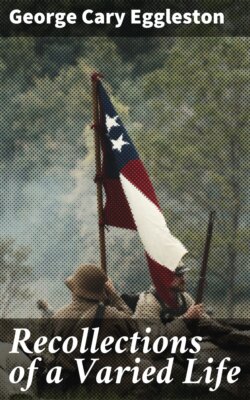Читать книгу Recollections of a Varied Life - George Cary Eggleston - Страница 4
На сайте Литреса книга снята с продажи.
II
ОглавлениеTable of Contents
It is difficult for any one belonging to this modern time to realize the conditions of life in this country in the eighteen-forties, the period at which my recollection begins.
The country at that time was all American. The great tides of immigration which have since made it the most cosmopolitan of countries, had not set in. Foreigners among us were so few that they were regarded with a great deal of curiosity, some contempt, and not a little pity. Even in places like my native town of Vevay, Indiana, which had been settled by a company of Swiss immigrants at the beginning of the century, the feeling was strong that to be foreign was to be inferior. Those who survived of the original Swiss settlers were generously tolerated as unfortunates grown old, and on that account entitled to a certain measure of respectful deference in spite of their taint.
The Lure of New Orleans
To us in the West, at least, all foreigners whose mother tongue was other than English were "Dutchmen." There is reason to believe that this careless and inattentive grouping prevailed in other parts of the country as well as in the West. Why, otherwise, were the German speaking people of Pennsylvania and the mountain regions south universally known as "Pennsylvania Dutch?"
And yet, in spite of the prevailing conviction that everything foreign was inferior, the people of the Ohio valley—who constituted the most considerable group of Western Americans—looked with unapproving but ardent admiration upon foreign life, manners, and ways of thinking as these were exemplified in New Orleans.
In that early time, when the absence of bridges, the badness of roads, and the primitive character of vehicular devices so greatly emphasized overland distances, New Orleans was the one great outlet and inlet of travel and traffic for all the region beyond the mountain barrier that made the East seem as remote as far Cathay. Thither the people of the West sent the produce of their orchards and their fields to find a market; thence came the goods sold in the "stores," and the very money—Spanish and French silver coins—that served as a circulating medium. The men who annually voyaged thither on flat-boats, brought back wondering tales of the strange things seen there, and especially of the enormous wickedness encountered among a people who had scarcely heard of the religious views accepted among ourselves as unquestioned and unquestionable truth. I remember hearing a whole sermon on the subject once. The preacher had taken alarm over the eagerness young men showed to secure employment as "hands" on flat-boats for the sake of seeing the wonderful city where buying and selling on the Sabbath excited no comment. He feared contamination of the youth of the land, and with a zeal that perhaps outran discretion, he urged God-fearing merchants to abandon the business of shipping the country's produce to market, declaring that he had rather see all of it go to waste than risk the loss of a single young man's soul by sending him to a city so unspeakably wicked that he confidently expected early news of its destruction after the manner of Sodom and Gomorrah.
The "power of preaching" was well-nigh measureless in that time and region, but so were the impulses of "business," and I believe the usual number of flat-boats were sent out from the little town that year. The merchants seemed to "take chances" of the loss of souls when certain gain was the stake on the other side, a fact which strongly suggests that human nature in that time and country was very much the same in its essentials as human nature in all other times and countries.
